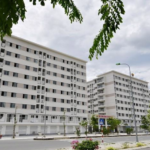During the seminar “Untying the Knot and Preventing Policy Abuse in Social Housing,” Mr. Ha Quang Hung, Deputy Director of the Housing and Real Estate Market Management Department of the Ministry of Construction, stated that the first step is to define what constitutes a reasonable price for social housing. According to current legal regulations, the allowed selling price of social housing is determined by the investor, taking into account the various cost components. The price will vary depending on the specific project.
“For instance, if we already possess clean land and construct a residential building, the price of social housing will primarily consist of the construction cost of that building. However, if this is an independent social housing project where the investor has to develop the technical and social infrastructure, these additional costs will be factored into the selling price. Even though land use fees for both types of projects are waived by the state, the expenses incurred can differ significantly,” explained Mr. Hung.

Mr. Ha Quang Hung, Deputy Director of the Housing and Real Estate Market Management Department (Ministry of Construction), asserted that while the prices set by businesses have increased significantly compared to before, they remain considerably lower than those of commercial housing.
According to Mr. Hung, the cost of social housing with comprehensive and synchronized technical infrastructure will be higher compared to constructing a residential apartment building alone. Additionally, although land use fees for social housing projects are waived by the state, in cases where land clearance, compensation, and resettlement are necessary, these expenses must be included in the cost calculation unless the state provides support to the business. Consequently, the price will be higher compared to projects with readily available clean land.
Mr. Hung emphasized that if the locality allocates clean land to be handed over to the state for investment, along with investing in synchronized technical infrastructure and social infrastructure connected to the land area for social housing development, the selling price of social housing apartments will be reduced compared to cases where the investor has to bear the costs independently.
“In reality, there may be cases where the selling price of social housing is not determined accurately according to regulations. For example, inappropriate allocation of profits between commercial and social housing or a profit margin higher than the prescribed 10% for social housing projects. We can entirely control this through state management, specifically through independent auditing units or the State Audit Office, the Department of Construction, and the Department of Finance,” said Mr. Hung.
Mr. Hung further mentioned that the recently passed resolution on social housing requires investors to proactively apply the methods for determining the selling price of social housing as stipulated by law. However, investors must hire a competent consulting unit to appraise this selling price before making any public announcements.
Once the project is completed, the investor must still engage an independent auditing unit, and the State Audit Office will audit the projects utilizing public investment capital. The audit results will be sent to the Department of Construction to provide feedback on whether the selling price complies with the regulations. There will also be sanctions if the investor sells at a price higher or lower than the settled price, and the investor will not be allowed to collect additional payments.
“I believe that this regulation will provide flexibility for investors while reducing the workload for state management agencies at the local level, ensuring transparency and fairness for investors and buyers, allowing them to access products at appropriate prices,” stated Mr. Hung.
Mr. Hung added that another factor contributing to the recent price increases is that businesses are starting construction and calculating prices based on practical costs in the market. These costs include expenses related to prolonged project implementation, management, operation, and borrowing, which accumulate over time. Additionally, input costs such as labor, materials, and supplies, especially scarce resources, have been increasing significantly, and businesses must consider these factors when initiating projects at the present time.
The Housing Authority leader asserted that while the prices set by businesses have increased significantly compared to before, they remain considerably lower than those of commercial housing.
The Never-Ending Story: The Social Housing Project That’s Almost a Decade Late
The Tan Binh Apartment – a mixed-use residential and social housing project located at 32 Hoang Bat Dat, Ward 15, Tan Binh District, Ho Chi Minh City – was slated for completion and handover to residents by October 2016. However, as of now, many homebuyers are still awaiting the delivery of their homes, sparking concerns and raising questions about the project’s progress and timely completion.
The Ultimate Guide to Buying Into the Hottest Social Housing Project: Why Hundreds Are Lining Up
Amidst the scorching sun, a serpentine queue of eager prospective homeowners formed for the An Trung social housing project in Son Tra District, Danang. Dedicated applicants shared that they had been waiting since the previous afternoon, the 29th of June, to secure their place in the lottery for submission order.
The New Housing Revolution: How Hai Phong is Leading the Way
As of June 28th, the People’s Committee of Hai Phong city announced the completion of over 14,600 social housing units, swiftly approaching their target of 15,000 units by 2025.
“Hưng Thịnh Incons (HTN) Embraces New Growth Phase: Geared for the Next Cycle of Expansion.”
On June 27, in the beautiful coastal province of Khanh Hoa, Hung Thinh Incons Joint Stock Company (HOSE: HTN) held its Annual General Meeting of Shareholders for the year 2025. This pivotal gathering marked a significant turning point in the company’s comprehensive restructuring journey and set in motion a new cycle of growth and prosperity.










![[Photo Essay]: Experts, Managers, and Businesses Unite to Forge a Path Towards Sustainable Green Industry](https://xe.today/wp-content/uploads/2025/07/z678592918-150x150.jpg)


![[Photo Essay]: Experts, Managers, and Businesses Unite to Forge a Path Towards Sustainable Green Industry](https://xe.today/wp-content/uploads/2025/07/z678592918-100x70.jpg)







